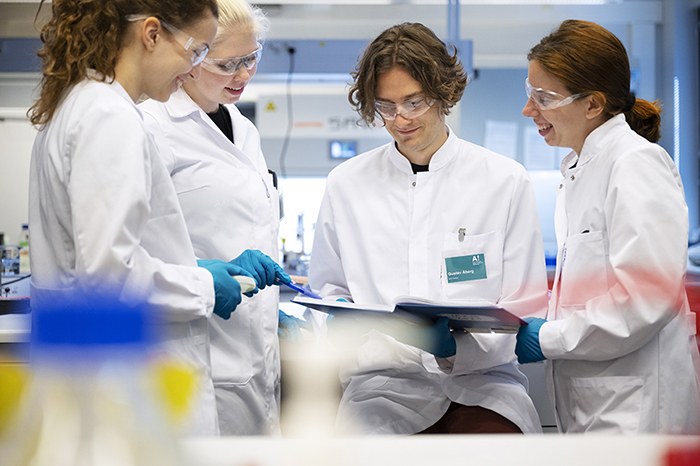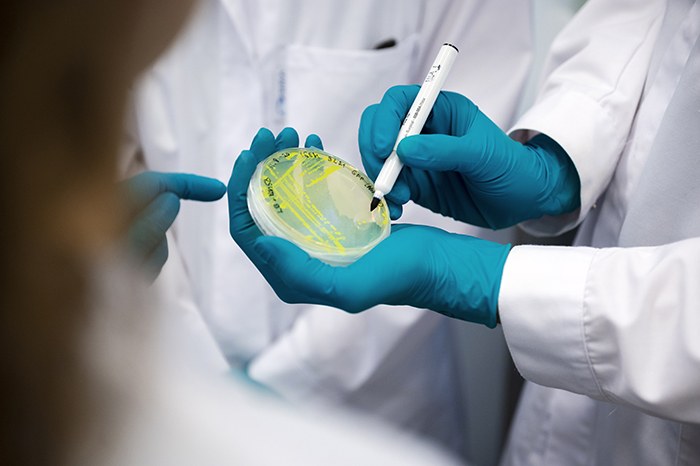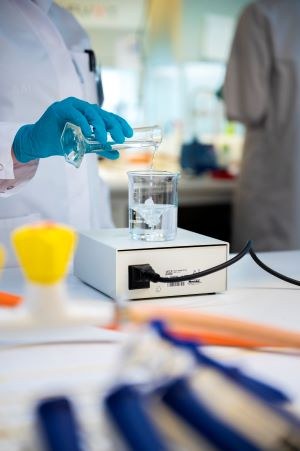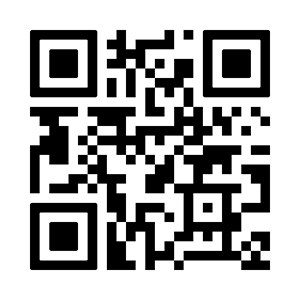
Bacteria tuned by students reveal antibiotic residues
If there are antibiotics in the water, cells start to produce green light.
Wastewater plants cannot currently remove all the antibiotics from wastewater, which is harmful for the environment and for the potency of antibiotics.
Therefore, a multidisciplinary student group, Aalto-Helsinki 2020, is developing a biosensor prototype, which detects macrolide antibiotics in wastewater. The biosensor is a measuring device, which detects compounds with the help of biomolecules or an organism.
The joint research group consisting of students from Aalto University and the University of Helsinki is participating in the international iGEM science competition with a research project aiming to help prevent the release of antibiotics into nature.

The group wanted to focus on solving environmental issues in the project. Water was a natural choice for the research topic, since Finland has a lot of water resources and the group members were experienced in wastewater treatment processes due to their studies and work experience.
When the team asked experts about current issues in wastewater treatment, antibiotic pollution in the environment became a topic of conversation.
Antibiotics end up in the environment either through wastewater or as a result of improper recycling processes.
In nature, antibiotics can end up back into humans via animals, for example. This cycle can lead to the development of antibiotic resistant bacteria, which weakens the effectiveness of medicines.

The biosensor developed by the students will help improve the removal process of antibiotics in wastewater treatment plants in the future.
The team leaders of the research group, biotechnology student Tytti Jämsä and evolutionary biology student Carla Coll Costa, are excited about the student-lead project.
The students work on the year-long research project in the spring and fall alongside their studies. In the summer, the project is a paid summer job funded by the two universities.
– From a student’s point of view, I could not think of a better summer job. You will learn a lot and at the same time, have a good time, Jämsä says.
– There will be a lot of work, but it is very rewarding, Coll Costa adds.
Bacteria detect the antibiotics
In the iGEM competition, student teams all over the world solve real-world problems with the help of synthetic biology. Synthetic biology refers to the development of biological systems, which are built and designed by humans and not found in nature.
– We use the E.coli bacterium as our biosensor. Currently we are manipulating the bacterium to detect macrolide antibiotics, Jämsä says.

The manipulation of the bacterium is done by building plasmids, circular DNA molecules. They are transformed inside of the bacterium, so it can become a biosensor.
– Our final product can be thought of as a small analysis box with the bacteria inside of it. The wastewater plant takes a water sample and pours it into the box. If the sample is clean, nothing happens, but if there are antibiotics present, the cells start to produce fluorescence. Fluorescence is green light and its intensity helps determine the concentration of antibiotics in the sample, Coll Costa adds.
There is no corresponding biosensor in the market. Currently, if a wastewater treatment plant wants to determine the concentration of medicines in wastewater, the sample must be taken to a laboratory.
Making wastewater treatment more accessible to the public
The Aalto-Helsinki 2020 group started the research project in February. The coronavirus pandemic delayed the start of the laboratory experiments and turned all the meetings into virtual ones. The iGEM competition, held annually in Boston, was turned into a virtual competition as well.
– A friendly competition is great, because scientists collaborate in real life as well.
Despite the pandemic, the research group has collaborated with many other iGEM teams, such as the Nordic, German and Indian teams. In the iGEM competition, participants are encouraged to collaborate and network internationally with other teams.
– A friendly competition is great, because scientists collaborate in real life as well. In addition to other teams, we have advisors and mentors from our universities and sponsors, who have been very supportive, Coll Costa says.
The expertise of the Aalto-Helsinki group members has developed as the students of biosciences, technology, physics, and chemistry have brought their skills together and learned from each other. In addition to science, the team members have also gained new skills in fundraising, marketing, and graphic design, among others.

Because the research group wants to educate people on the importance of wastewater treatment, the group has developed a Fix the Flow mobile game in which the player has to clean a wastewater flow. The aim of the game is to familiarize people of all ages with wastewater treatment in a fun way.
Jämsä and Coll Costa are motivated by the independent nature of the project and by the fact the there is a demand for such a biosensor.
– It is fun to develop something you have ideated and brought to life yourself. We’re contributing to solving the problem, which is cool, Coll Costa says.
– If I end up being a scientist, this is exactly what I would like to do – solve problems with the help of science, adds Jämsä.
The application process to the next iGEM team starts in December. Follow Aalto-Helsinki Instagram for more information: @aaltohelsinki_igem
Fix the Flow -mobile app can be downloaded from App Store or Google Play under the name Fix the Flow.
The QR code of Fix the Flow -game

Read more about the project on Aalto-Helsinki web site
Read more about the competition on iGEM web site
What is iGEM?
• IGEM (International Genetically Engineered Machine) is an American non-profit organization, which supports the advancement of synthetic biology, education, and competition.
• IGEM’s biggest program is the iGEM Competition for students.The competition has been held since 2004. In 2019, there were 345 participating teams.
• The project topics of the competition have been for example energy- and food production, healthcare, medical science, and the environment. The teams use interchangeable biological parts and standard molecular biology techniques.
• During 2016-2019, the Aalto-Helsinki group has won two gold and two silver medals in the competition.